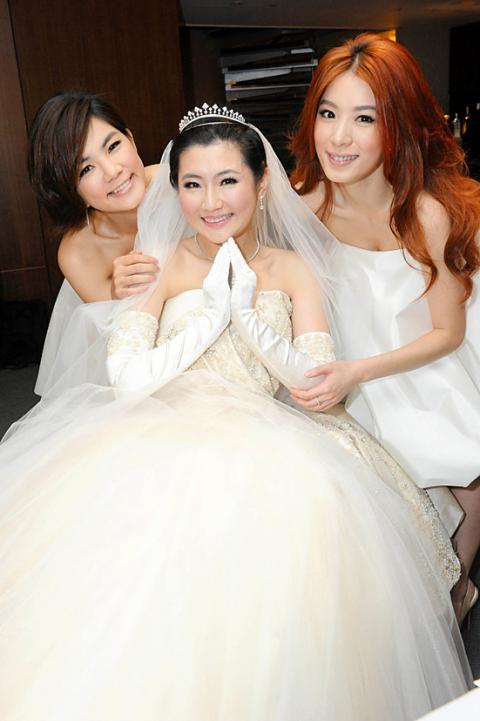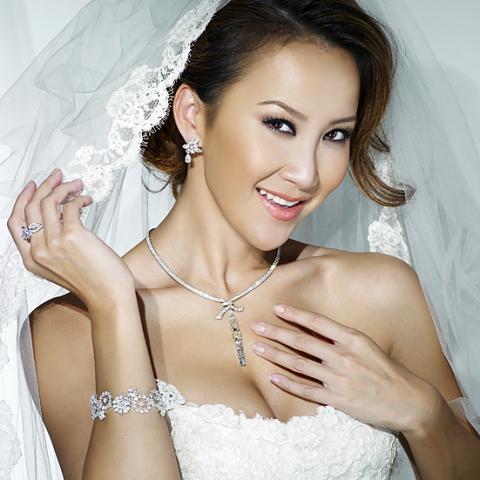As 2011 draws to a close, celebrities have made this the year of the showbiz wedding.
Over the past 10 months, a slew of A-listers, including self-styled actress Barbie Hsu (徐熙媛, aka Big S), TV sweetheart Patty Hou (侯佩岑), star couple Christine Fan (范瑋琪) and Charles Chen (陳建州, better known as Blackie), singer Stephanie Sun (孫燕姿) and belle Kelly Lin (林熙蕾) have tied the knot.
The nuptials that received top media billing were those of pop singer Selina Jen (任家萱), who wed 39-year-old lawyer Richard Chang (張承中).

Photo: Taipei Times
Following a year of medical treatment for serious burns she sustained while filming a TV show in China in October last year, Jen, a member of girl band S.H.E, was married on her 30th birthday, on Monday.
The event, full of warm, touching moments as the teary-eyed bride received blessings from friends and relatives, attracted more than 200 members of the media.
Because of her injuries, Jen sat through most of the three-hour-long wedding reception. The Apple Daily reported that the star underwent eight hours of rehabilitation each day since suffering multiple third-degree burns and cannot stand for longer than five minutes without taking a break.

Photo: Taipei Times
Not ones to let romance go to their heads, gossip hounds spent the evening sniffing out awkward moments between celebrity guests who are erstwhile lovers or old rivals.
Attention focused on pop diva Chang Hui-mei’s (張惠妹, better known as A-mei, 阿妹) old flame Wang Lee-hom (王力宏) and rumored new love Harlem Yu (庾澄慶). Much to the dismay of members of paparazzi, Wang and Chang were seen conversing over drinks amicably.
“We are good friends,” Wang told reporters.
Things were less peaceful between Jolin Tsai (蔡依林) and Patty Hou, who reportedly stole Jay Chou (周杰倫) from Tsai in 2004. In response to years-old rumors of a feud between her and Tsai, the married Hou claimed she often bumped into Tsai at the airport, and they always greet each other.
“Did I do that?” Tsai replied when asked to comment on Hou’s remark.
Meanwhile, in Hong Kong, international star Coco Lee (李玟) became the subject of admiration and envy when she wed 52-year-old Canadian businessman Bruce Rockowitz in a lavish ceremony on Thursday last week.
In terms of sumptuousness, Lee and Rockowitz’s nuptials lead the field, with two days of celebrations that reportedly cost NT$600 million. The wedding was rated by the press as the most expensive to be held in Hong Kong.
Readers might wonder how hundreds of millions of NT dollars could be spent in just two days, but with more than 300 guests flying in from the four corners of the world to attend the ceremony and stay at the Ritz-Carlton hotel, all courtesy of the newly weds, it’s not such a surprise.
Entertainment was provided by Grammy-winning musicians Bruno Mars, Alicia Keys and Ne-Yo, while the Shaw Brothers Film Studio, which, according to the Liberty Times (the Taipei Times’ sister paper), is normally not allowed to be rented out for private use, was turned into a playground for the rich and powerful.
Guests who graced the event included fashion designer Tommy Hilfiger and Christopher Patten, the last governor of Hong Kong.
Jennifer Lopez, Oprah Winfrey and Beyonce, however, didn’t show up as previously promised.

In the March 9 edition of the Taipei Times a piece by Ninon Godefroy ran with the headine “The quiet, gentle rhythm of Taiwan.” It started with the line “Taiwan is a small, humble place. There is no Eiffel Tower, no pyramids — no singular attraction that draws the world’s attention.” I laughed out loud at that. This was out of no disrespect for the author or the piece, which made some interesting analogies and good points about how both Din Tai Fung’s and Taiwan Semiconductor Manufacturing Co’s (TSMC, 台積電) meticulous attention to detail and quality are not quite up to

April 21 to April 27 Hsieh Er’s (謝娥) political fortunes were rising fast after she got out of jail and joined the Chinese Nationalist Party (KMT) in December 1945. Not only did she hold key positions in various committees, she was elected the only woman on the Taipei City Council and headed to Nanjing in 1946 as the sole Taiwanese female representative to the National Constituent Assembly. With the support of first lady Soong May-ling (宋美齡), she started the Taipei Women’s Association and Taiwan Provincial Women’s Association, where she

Chinese Nationalist Party (KMT) Chairman Eric Chu (朱立倫) hatched a bold plan to charge forward and seize the initiative when he held a protest in front of the Taipei City Prosecutors’ Office. Though risky, because illegal, its success would help tackle at least six problems facing both himself and the KMT. What he did not see coming was Taipei Mayor Chiang Wan-an (將萬安) tripping him up out of the gate. In spite of Chu being the most consequential and successful KMT chairman since the early 2010s — arguably saving the party from financial ruin and restoring its electoral viability —

It is one of the more remarkable facts of Taiwan history that it was never occupied or claimed by any of the numerous kingdoms of southern China — Han or otherwise — that lay just across the water from it. None of their brilliant ministers ever discovered that Taiwan was a “core interest” of the state whose annexation was “inevitable.” As Paul Kua notes in an excellent monograph laying out how the Portuguese gave Taiwan the name “Formosa,” the first Europeans to express an interest in occupying Taiwan were the Spanish. Tonio Andrade in his seminal work, How Taiwan Became Chinese,